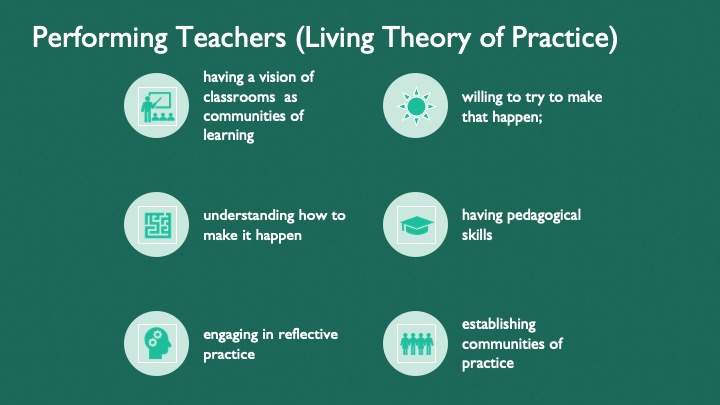Theoretical framework
The underpinning premise for this project is that a significant factor contributing to the problem of low achievement rates in early grade literacy and numeracy in Cambodian schools relates to the teacher’s conception of their role and their sense of professional identity[1].
Although teacher professional identity is widely recognised as a critical component of teacher education and formation it is difficult to find a single universal definition. It is certainly complex and operates along several dimensions.
As we might expect, teacher professional identity is framed within a wider cultural context. In Cambodia, the cultural profile[2] of the country and its education system will have a significant influence on how teaching and learning are regarded.
Teachers’ perceptions of what it means to learn, how they define the tasks of teaching, how they see themselves and rate their capabilities – all of these (and more besides) will have a direct influence on how they develop their practice and adopt paths to improvement.
These perceptions, or we might even say ‘theories of learning’, are shaped by combinations of experience and influence. Given the history and context of Cambodian education, it is difficult to see how these prevailing, often limited, perceptions of what it means to be a teacher may be altered without interventions such as proposed in this research.
From a pedagogical perspective the task is most clearly articulated in the shift from what Freire[3] calls the ‘banking’ or ‘transmission’ model of education to more problem posing education. As Freire puts it “men and women develop their power to perceive critically the way they exist in the world with which and in which they find themselves; they come to see the world not as a static reality but as a reality in the process of transformation.”
This is not simply a case of learning new methods. The shift is more fundamental and transformative. Following Illeris[4], the ‘forms’ that are transformed in this adult learning process involve changes to identity. The potential for such an identity shift is hugely significant for practicing teachers. No longer passively accepting a fixed view of learning and teaching, instead moving to a dynamic, inquiry-based perception of ‘what makes a good teacher’.
A review of studies[5] of psychometric instruments for teacher professional identity suggests six domains that recur in many of the studies:

It is easy to see how each of these will contribute to what takes place in the classroom setting.
Teacher professional identity is a core enabler for a wider framework of teaching capability and competence. Effective teaching involves a wide range of skills, knowledge and disposition to activate learning in pupils and to engage in a continuous cycle of professional development and improvement. The intended lines for teacher development are well stated by the American educationalist Lee Shulman[6] where he suggests teachers becoming:

These are a far cry from the reality of what takes place today in Cambodian schools. Professional development for Cambodian teachers will certainly involve transformative learning. Analysis suggests three core epistemological positions that may be transformed as teachers develop their practices along the lines indicated by Shulman. The first relates to the question of how teachers regard learning, put simply, what is their theory of learning? What do they think happens when people learn? The second position relates to how they regard the role of the teacher, particularly the function of teaching and how it may develop through practice. And thirdly, their position on knowledge, specifically professional knowledge and sources of insights to inform practice improvement.
This theoretical overview suggests some of the elements that will underpin a Framework for Teacher Professional Identity in Cambodia. The six domains – self-image, motivation, commitment, self-efficacy, task perception, and job satisfaction and the three transformations of understanding in relation to learning, teaching, improvement, provide conceptual starting points.
However, the challenge is to derive a meaningful set of tools to make an operational and useful framework in the context of Cambodian teachers. The researchers do not underestimate this task. To be successful, professional development approaches need to start with a clear picture of what’s happening in schools and how teachers understand their role. Furthermore, the development of resources and instruction (for teachers) needs to be grounded in an understanding of the teacher as situated in the school and community context. Interventions that do not account for these factors simply will not work. In the research approach set out below the proposers (NCI, DoPo, SeeBeyondBorders and PTEC) are building on their experience in the field[7]. In addition to addressing the top-level goals, this research will pave the way for wider and deeper understanding of what’s happening in Cambodian schools. In this way further research and interventions can be better targeted and are more likely to succeed.
This project is funded by the Irish Research Council.
#LoveIrishResearch
[1] Catherine Beauchamp, and Lynn Thomas, “Understanding Teacher Identity: An Overview of Issues in the Literature and Implications for Teacher Education,” Cambridge Journal of Education 39, no. 2 (2009).
[2] Jan B. Y. Berkvens, “The Importance of Understanding Culture When Improving Education: Learning from Cambodia,” International Education Studies 10, no. 9 (2017).
[3] Paulo Freire, Pedagogy of the oppressed. Bloomsbury publishing USA, 2018
[4] Knud Illeris, “Transformative learning and identity.” Journal of Transformative Education 12.2 (2014): 148-163.
[5] Fadie Hanna et al., “Domains of Teacher Identity: A Review of Quantitative Measurement Instruments,” Educational Research Review 27 (2019).
[6] Lee S Shulman, and Judith H Shulman, “How and What Teachers Learn: A Shifting Perspective,” Journal of Education 189, no. 1-2 (2009).
[7] Shuttleworth, E. & Shutteworth, C. , An Assessment of Early Grade Teaching Quality in Cambodia. (Battambang: SeeBeyondBorders, 2017).
